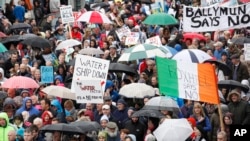Tens of thousands of people marched in towns across Ireland on Saturday in a second day of mass protests against water charges, the biggest display of opposition to government austerity measures since the country's banking crisis and bailout in 2010.
In a further blow to Prime Minister Enda Kenny, an opinion poll Saturday showed his center-right Fine Gael party had slipped 4 percentage points behind left-wing Sinn Fein, the largest party opposing water charges.
Ireland emerged from its European Union-International Monetary Fund bailout last year and the economy is rebounding, with the government forecasting economic growth of close to 5 percent this year. But protesters said they were not seeing the benefits and austerity had hit lower-paid people disproportionately hard.
"This isn't just about the water, it's about the last five years,'' said Paul, a 55-year-old sign painter who said he had had to give up his car, his life insurance and his health insurance.
"I was thinking about buying a new pair of shoes this year. It's come to that. Enough is enough," he said. He did not give his second name to avoid attracting attention to his business.
Banners called on people not to pay the new charges, which are likely to cost the average household between 200 and 400 euros ($500) per year. Up to now, water services have been financed by general taxation.
Marches took place in dozens of towns across Ireland. Over 20,000 people gathered at the largest protest, in Dublin, which was dominated by grass-roots local groups rather than the mainstream opposition parties. State broadcaster RTE estimated 120,000 people protested across the country.
Water charges have dominated the Irish media for months, with almost daily revelations about high pay and bonuses for executives and new charges for consumers.
The government, which agreed to introduce water charges under the EU-IMF bailout, has proposed some exemptions, but has not indicated it is considering reversing the charges.
"People have legitimate concerns about some aspects of this," and the government is listening, Kenny told journalists after the protests. "Over the next number of weeks, we will set out what people really want to hear, and that's clarity and certainty about how much they pay.''
The surge in anti-government protests comes after years of relative calm in the face of far more stringent austerity measures in 2011 and 2012 and a bailout for banks that amounted to about one-third of the Irish gross domestic product.
"The curious thing is that it took so long, that something as trivial as setting up a proper water company seems to have been the straw that broke the camel's back,'' said Michael Marsh a professor of politics at Trinity College Dublin. "Clearly, there is a lot of public anger out there."
A Millward Brown poll for the Sunday Independent in Dublin showed 22 percent would vote for Fine Gael at the next election, due in 18 months, compared with 26 percent for Sinn Fein. Just 7 percent would vote for junior coalition partner Labor, which political analyst Adrian Kavanagh estimated would give it two seats in the 166-seat lower chamber.





